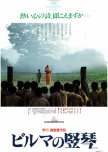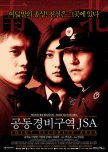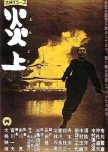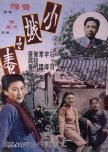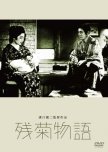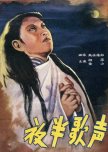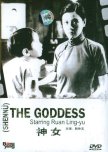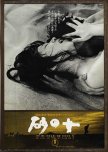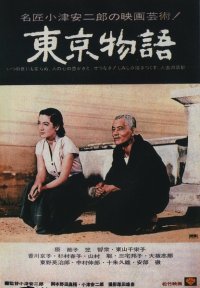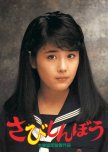- Français
- English
- magyar / magyar nyelv
- dansk
- Titre original: ビルマの竪琴
- Aussi connu sous le nom de: Biruma no tategoto , Harp of Burma
- Réalisateur: Ichikawa Kon
- Scénariste: Wada Natto
- Genres: Militaire, Musique, Historique, Guerre
Distribution et équipes
- Yasui ShojiMizushimaRôle principal
- Mikuni Rentaro Rôle principal
- Nakahara KeishichiTakagi IttoheiRôle Secondaire
- Mihashi Tatsuya[Defense Commander]Rôle Secondaire
- Hamamura JunPvt. ItoRôle Secondaire
- Naito TaketoshiPvt. KobayashiRôle Secondaire
Critiques

Cette critique peut contenir des spoilers
Surprise no review. It is black & white but oh boy., I laughs and I cry. The songs the soldier sing kept repeat in my head. Not sure if it is a true story but they are so sweet. It show how disgusting the war is, but the solders are so united, so full of emotion and very sweet. I have watch this several times and its really touch my heart. Really worth watching. Everyone need to watch this movie at least one in their life time. I normally don’t like war movie, but this is not typical war movie. It is very touching story. The soldier have very sweet voice, they will certainly capture your hearts ? ❤️
Cet avis était-il utile?

"The soil of Burma is red. So are the rocks."
The Burmese Harp was a WWII film based on a children’s book by Takeyama Michio from 1946. The book was written to help young readers come to terms with Japan’s defeat while demonstrating Buddhism’s emphasis on altruism. Music featured prominently with both the Japanese and British soldiers singing as well as the playing of the titular instrument. This was the kindest, gentlest war film I’ve ever seen as the Japanese soldiers came to grips with their country’s loss and hoping to see home again.A small group of Japanese soldiers are making their way through Burma (Myanmar) to Thailand when they are captured by the British. They learn the war has been over for three days. Capt. Inouye is unsure of what lies ahead of them but says they will face it like men and they will face it together. The Allies ask for a soldier to try and talk a group of holdouts on Triangle Mountain into surrendering. Inouye sends the harp playing Mizushima Yasuhiko and tells him to catch up with them at the Mudon POW camp 200 miles/322 km from where he will be after the mission. Unlike Inouye and his group of singing soldiers, the fanatical soldiers on the mountain don’t care that the war is over. They want to die for their Emperor and call Mizushima a coward. The Brits hit the hideout hard and Mizushima is the only one to survive. A traveling monk rescues him and nurses him back to health. While the monk is bathing in the river, Mizushima steals his clothes and later shaves his head so that he can make the arduous trip back to his men. Along the way he repeatedly comes across the decaying bodies of Japanese soldiers left where they lay. He buries a handful before continuing his journey. When he reaches the Buddhist monastery at Mudon he teaches a young boy a few new chords on the harp (Saung). The next morning he hears singing and finds the Allied hospital staff at the camp singing and praying over a Japanese soldier they have buried. Something inside of him fundamentally alters at this sight and instead of joining his men he turns back to bury the dead. Meanwhile, his men grow ever more concerned at his absence.
This film fell more into fable or fairytale than realistic war drama. Director Ichikawa showed the ravages of war and starvation in his excellent film Fires on the Plain (1959). While the book supposedly touched on Japan’s responsibility for the war and was critical of Japan’s militaristic actions and mindset, this movie veered away from those criticisms. Since the core concept of the film was for children--comfort women, the Nanjing Massacre, and dire reality for Allied prisoners in Japanese POW camps where 40% died was left out. This was a film about healing, friendship, and spiritual transformation in the face of defeat while not shying away from the staggering loss of life from war.
Music played an almost magical role for the soldiers in healing and binding the men together. It also brought out the shared humanity between the Japanese and Allied personnel. “Home, Sweet, Home” was sung by both groups and at one time all together. As Mizushima observed the scattered bodies with birds feeding on them, “O, Sacred Head Now Wounded” played in the background. In typical 1950’s fashion, the men sounded like a professional chamber choir when they sang and Mizushima’s battered saung provided the clear, dulcet tones of an orchestra’s multi-octave harp.
The soldiers longed for home and longed for peace. As they dreamed of returning to their lives in Japan they had no idea of the drastic changes ahead or that many places would be unrecognizable. Mizushima had been reborn while assisting the dead to rest in peace. He had to decide whether to stay in Burma and mend the past or go home and help rebuild his country. While this film may have shown a more idyllic version of humanity it couldn’t hide the horror and monstrous cost of war and didn’t try. This type of meditative, comforting film in the face of upheaval and how humans choose to react and grow was right up my alley. I thoroughly enjoyed The Burmese Harp. “…our work is simply to ease the great suffering of the world…to find the strength to create peace by one’s own example.”
2 May 2024
Home, Sweet, Home (For those too young to be familiar with it)
“Mid pleasures and palaces though we may roam
Be it ever so humble, there's no place like home
A charm from the skies seems to hallow us there
Which seek thro' the world, is ne'er met elsewhere
Home! Home!
Sweet, sweet home!
There's no place like home
There's no place like home!
An exile from home splendor dazzles in vain
Oh give me my lowly thatched cottage again
The birds singing gaily that came at my call
And gave me the peace of mind dearer than all
Home, home, sweet, sweet home
There's no place like home, there's no place like home!”
Cet avis était-il utile?

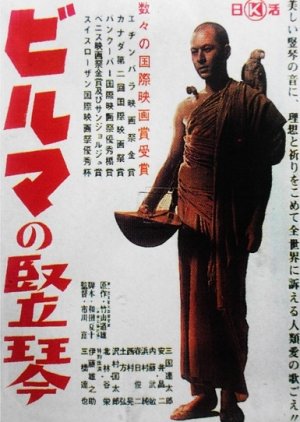






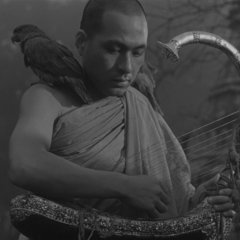
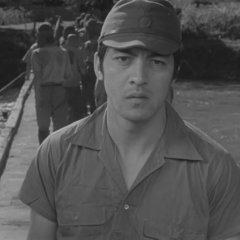
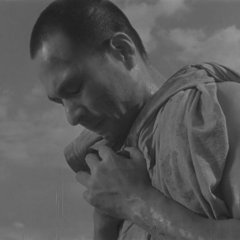
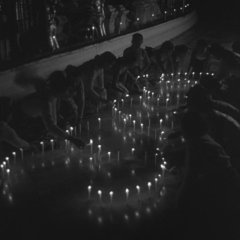
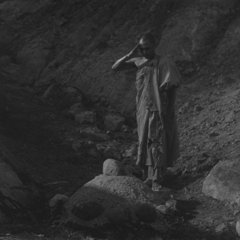
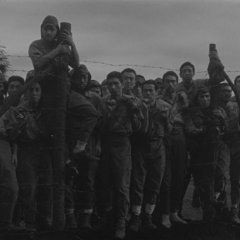
 1
1
